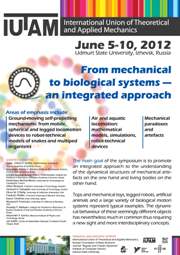Nowadays, there are several research groups in the world working at development of new means of locomotion. On the one hand, the interest in the subject is due to the necessity of increasing the reliability and maneuverability (especially in the reality of city traffic) of transport vehicles. On the other hand, “exotic” vehicles can find their applications in various unusual or hostile environment which can be encountered in space and extraterrestrial missions. Design of such vehicles is inalienable from the investigation of their dynamical properties and development of a relevant control system. As a rough approximation for a mechanical system that incorporates the rolling motion of one body over the surface of another, one can use a proper non-holonomic model (sliding-free rolling). In spite of its apparent simplicity, within the framework of the non-holonomic approach quite a number of dynamics phenomena can be explained adequately. Thus, it seems quite reasonable to use non-holonomic models at the initial stage of the development of wheel suspensions. The next stage must account for friction effects and impacts. Finally, after fulfillment of these tasks one can proceed with building a prototype vehicle.
The main research avenues of the non-holonomic mechanics section are as follows:
1. Hierarchy of dynamical systems.
There is planned an exhaustive classification of non-holonomic dynamical systems in respect to their tensor invariants and description of the dynamical behavior of such systems.
2. Analysis of various types of transport vehicles.
In recent time an interest in vehicles with new types of wheel suspensions has been revived. Among these are ball suspensions an a so-called omni-wheel, which is able to move transversally to the wheel’s plane. The interest is mostly due to mobility and maneuverability such suspensions can provide. Today several types of omni-wheels have already found their application in the construction of wheelchairs. However, there is still lack of theoretical background and complete description of the dynamical properties of such wheels. In the laboratory we plan a thorough analytical and numerical investigation of various modern suspension mechanisms using the recent advances in the theory of dynamical systems.
3. Analysis of the influence of the friction and impact phenomena on the motion of vehicles.
We are planning a thorough investigation of curious dynamical phenomena such as the reverse in the rattleback’s dynamics, lift of the tippe top, the effect of double reverse in the dynamics of axi-symmetric rattlebacks, ringing of Euler’s disk, formation of a strange attractor in systems that involve rolling motion of dynamically asymmetrical rough ellipsoids. These effects are crucial in developing control strategies for vehicles equipped with new suspension mechanisms.
4. Development of control strategies.
As a prerequisite, one needs a clear understanding and classification of possible types of free (uncontrolled) motions of the system. One of the possible control strategies here is simply to switch between appropriately chosen free trajectories.
5. Development of an apparatus for experimental study of the friction and impact phenomena.
Now there exist several theories describing the friction and impact phenomena. However, how do these theories correlate with rich experimental data collected remains an unanswered question. In this connection, we plan the development of an experimental apparatus for the study of dynamical friction, impact events and related phenomena.
6. Development of experimental prototypes of suspension mechanisms.
To validate the results obtained in the study of free (uncontrolled) motion of mechanical systems and for verification of the control strategies proposed, experimental prototypes of new types of vehicles will be created.






